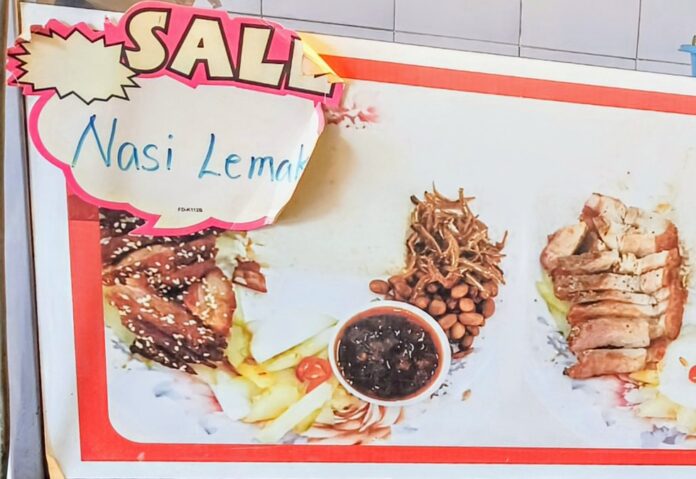Non halal Nasi Lemak, a popular dish on the menu at a restaurant in Inanam
By C C Pung
Justice of Peace
Cultures flourished and are enriched when ‘cross fertilised’.
INTERESTINGLY, some people are trying to promote pork-free, halal ‘kochung’.
I was pleasantly tickled and my mind drifted to past debates on alleged deception proliferated by businesses selling ‘chi kit teh’ (the chicken version of the essentially pork-based Chinese delicacy).
Controversies in the same vein were also stirred up with regards to ‘char kuey tiau’, and equally ubiquitous Malaysian food such as nasi lemak satay and nasi kandar.
Penang took char kuey tiau to the world.
The name is a phonetic translation of the stir-fry flat noodle dish name in Hokkien.
Traditionally (and some still believe as the best approach) CKT is done with lard,, lapcheong (Chinese pork sausage, blood cockles, eggs, chives, dark soy etc).
My palate may revolt just as I would when served with a nasi lemak sans rice cooked in santan wid served without the mandatory ikan bills and sambal.
There are muslim-run CKT stalls.
I don’ t remember seeing anyone bothered with advertising themselves as halal.
I thought this represents of our evolving multi-cultural society when aspects of the people’s lives begin to merge and lines begin to blur.
Pork bah kut teh is halal, of course.
But we surely can trust our muslim friends to be able to discern and fisticuffs guise between that and others served with chicken and seafood.
To say that ‘chi kut teh’ confuses Muslims is as insulting as insulting as objecting to ‘pork satay’ by claiming ownership and meaning of the word ‘satay’.
It is today a DlY word, but it’s been said that the word has roots not of Malay or Indonesian, the two countries claiming the origin of the delicacy.
Enterprising operators have intruded pork dishes to accompany nasi lemak.
The recent reports about ‘nasi kandar babi’ had some traditionalists calling for jihad.
The opponents to these new ideas shared a common concern – Muslims are confused.
Really? Are they that easy to deceive? What about the ‘stay away if unsure’ mantra?
Cultures are enriched and they flourished and are enriched when ‘cross fertilised’.
Food is an essential component of culture.
I think it’s a little self-righteous to assume a loss of sanctity when a ‘mix’ takes place.
I just saw a blog talking down pork and why pork-eating should be mocked.
More than half of humanity eat pork.
Pork is a billion-USD industry that’s a vital cog in the global economic wheel.
I don’t glorify pork eating to those who swear against it.
I therefore don’t need anyone telling me things I don’t already know. Pigs are dirty. But they’re not known to kill their own.
Neither are they heard complaining about being hated.
‘Kochung’ has a been eaten by the Chinese for millenia it is supposed to be something made and thrown into a lake in remembrance of a patriot.
I hope no religious idiot will emerge in the days ahead to talk the entrepreneur out of making a business out of a Malaysian version of ‘kochung’.
It has its roots in China.
So is there the Chinese element in the Malaysian roots.
Live on charkueytiu, chikutteh, porksatay, kandarbabi.
It’s Malaysia.
Stupid.
Editor: The views expressed are those of the writer and do not necessarily reflect that of talantang.com.



